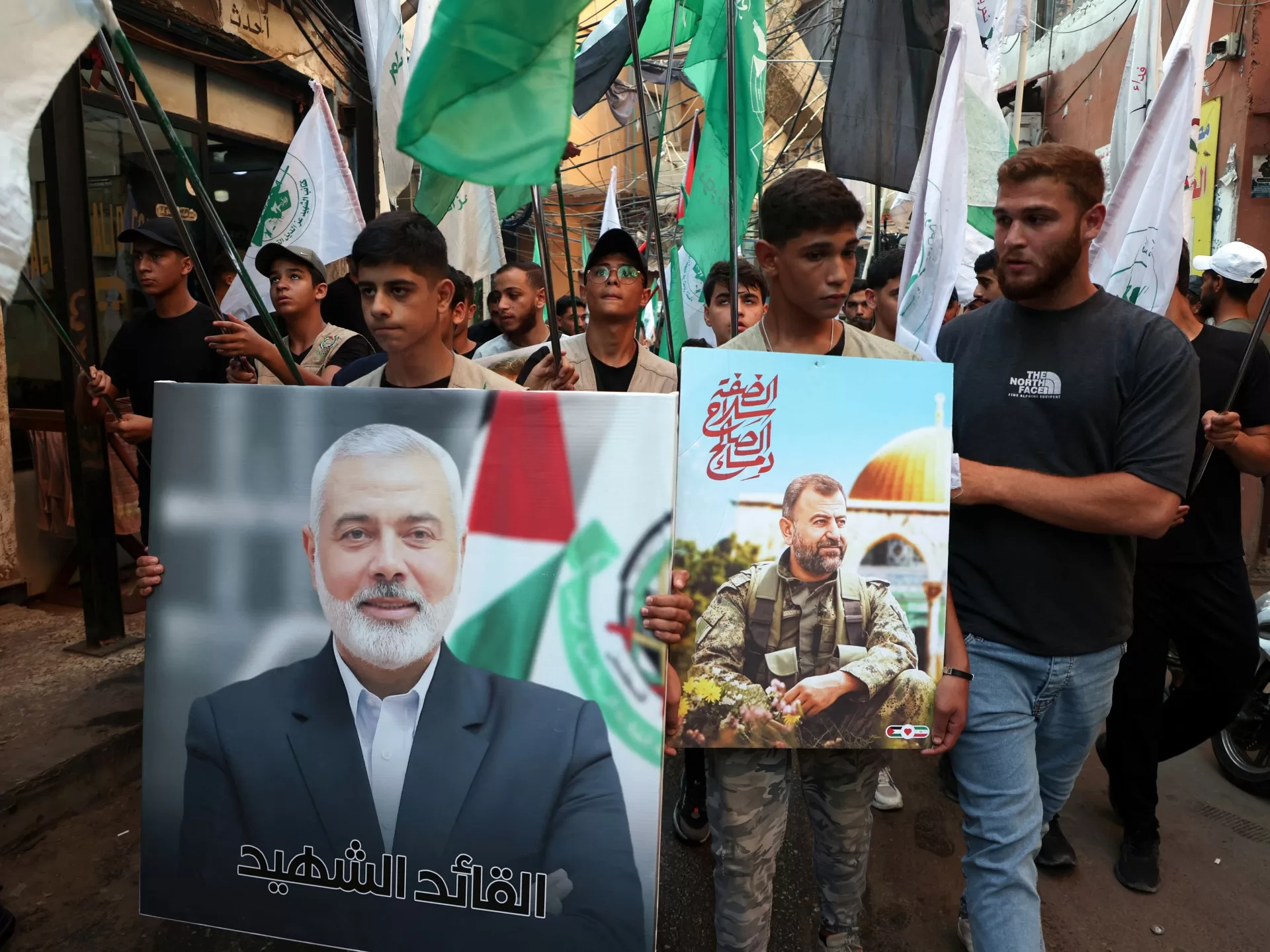Countries of the United Nations Security Council (UNSC) have condemned the assassination of Hamas’s political chief Ismail Haniyeh in Iran and called for stepped-up diplomatic efforts to prevent an all-out war in the Middle East.
The UNSC’s emergency meeting on Wednesday came as Iran and Hamas – the Palestinian group that governs the war-torn Gaza Strip – blamed Israel for Haniyeh’s death and pledged to seek revenge. Israel has not admitted responsibility for the attack in Tehran.
Haniyeh’s assassination occurred less than 24 hours after Israel killed Hezbollah’s most senior military commander Fuad Shukr in an air raid on the Lebanese capital, Beirut. Israel claimed the attack was in retaliation for a rocket assault that killed 12 children and young people from the Arab Druze community in the Israeli-occupied Golan Heights.
At the UNSC meeting, Palestine said the global community must stop Israel from dragging the Middle East into the “abyss”, while China, Russia and Algeria condemned Haniyeh’s assassination. The United States, United Kingdom and France raised what they said was Iranian support for destabilising actors in the region, while Japan said it feared an all-out war in the Middle East.
“Israel has been the oppressor, tormentor and murderer of Palestinians for decades, and it is the longstanding destabiliser of our region,” said Feda Abdelhady Nasser, the deputy permanent observer of the State of Palestine to the UN. “It must be stopped,” she said, while also calling for accountability for the killing of Haniyeh as well as the “murder and injury of over 130,000 Palestinian children, women and men across these past 300 days of horror and hell in Gaza”.
“The international community has a choice to make,” she added. “Let it be for peace and security. Do not let Israel drag us all to the abyss.”
Iran’s UN Ambassador Amir Saeid Iravani said Tehran has consistently exercised maximum restraint but reserved its right to respond decisively to Haniyeh’s assassination. He called on the UNSC to condemn Israel and punish it with sanctions.
“The Islamic Republic of Iran reserves its inherent right to self-defence in accordance with international law to respond decisively to this terrorist and criminal act when it deems necessary and appropriate,” Iravani said. “This act of terror is another manifestation of Israel’s decades-long pattern of terrorism and sabotage targeting Palestinians and other supporters of the Palestinian cause across the region and beyond,” he said.
Iravani went on to blame the US as well as “war-mongering leaders” in Israel for Haniyeh’s killing.
“The responsibility of the United States as a strategic ally, and main supporters of the Israeli regime in the region cannot be overlooked in this horrific crime. This act could not [have] occurred without the authorisation and intelligence support of the US,” Iravani said.
Gaza ceasefire talks
The US, however, denied any knowledge of the attack and said a broader war was neither imminent nor inevitable. Robert Wood, the US’s deputy ambassador to the UN, also called for members with influence over Iran “to increase pressure on it to stop escalating its proxy conflict against Israel and other actors”.
Israel meanwhile urged the UNSC to condemn Iran for what it called support of regional “terrorism” and increase sanctions on Tehran. Jonathan Miller, Israel’s deputy representative to the UN, also denounced what he called a lack of condemnation of Hezbollah for the killings in the town of Majdal Shams in the occupied Golan Heights. The Lebanese group has denied involvement in the attack.
“We will defend ourselves and respond with great force against those who harm us,” Miller said, calling on the world to support Israel.
Syria, from which Israel seized the Golan Heights in 1967, also spoke at the meeting, dismissing as “lies” Israeli claims that the rocket attack on Majdal Shams targeted Israel’s population. Syria’s ambassador, Koussay al-Dahhak, noted the territory is Syrian and accused Israel of “weaponising” the attack on the Druze community “to continue its aggression on the states of the region”.
Lebanon too contested Israel’s claim that its actions in the region were acts of self-defence.
“Israel’s claim that it seeks to protect the population it occupies is a display of hypocrisy,” said Hadi Hachem, Lebanon’s Charges d’Affaires for the UN. “The real goal of Israel is to prolong and escalate the hostilities. And it is ironic that the killer of tens of thousands of children in Gaza sheds tears for the children of the occupied Syrian Golan.”
Hachem also warned the UNSC that a conflict in the Middle East would have global repercussions.
“What starts in the Middle East will spread to the whole world,” he said.
Fu Cong, China’s ambassador to the UN, said failure to achieve a ceasefire in Gaza was responsible for worsening tensions.
He called for “countries with major influence” to put out the flames of war in the Palestinian enclave.
He went on to describe Haniyeh’s killing as “a blatant attempt to sabotage peace efforts” and urged Israel “to halt all its military operations in Gaza and immediately stop its collective punishment of the people in Gaza”.
Russia too described Haniyeh’s assassination as “a serious blow” for truce talks, while Shino Mitsuko, Japan’s deputy UN representative, said, “We fear the region is at the brink of all-out-war” and urged stepped-up international efforts to prevent such a conflict.
France and the United Kingdom also appealed for restraint, with London’s UN Ambassador Barbara Woodward reiterating a call for an immediate ceasefire in Gaza. She said Israel and Hamas needed to recommit to a peace process that would result in a two-state solution with a secure Israel and a sovereign Palestinian state.
“The path to peace must be through diplomatic negotiations. Long-term peace will not be secured by bombs and bullets.”
